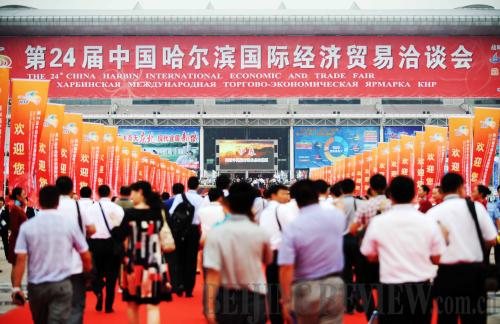|
 |
|
GRAND OPENING: Visitors peruse the exhibition hall of the 24th China Harbin International Economic and Trade Fair on June 15 (WANG JIANWEI) |
People always associate northeast China's Harbin, a city known as Eastern Moscow, with ice sculptures and down jackets. Indeed, it never fails to fascinate hordes of tourists, who stroll along historic Central Street with a frozen fudge pop.
But it doesn't mean the winter city is deserted in summer. Far from it. From June 15 to 19, the 24th China Harbin International Economic and Trade Fair was held in the capital city of Heilongjiang Province. More than 12,600 businesspersons from 75 countries and regions and 100,000 Chinese visitors attended the fair.
During the five-day exhibition, roughly 30,000 products were put on display by 1,900 enterprises, with a substantial increase in companies from Hong Kong, Macao and Taiwan.
Statistics released at the press conference on the closing day of the fair showed that 22 domestic trading delegations signed contracts worth $13.99 billion with 46 countries and regions. Of the deals, clothing, textiles, and equipment and machinery were the top three.
Moreover, China signed cooperative agreements regarding international talent exchange with 12 countries, including the United States, South Korea, Australia, Canada and Germany. Meanwhile, domestic companies also signed economic and technological cooperative projects worth 250.9 billion yuan ($40.95 billion).
"Since the Harbin trade fair was first held in 1990, it has evolved into a national-level pageant and a significant platform for economic cooperation between the nations of Northeast Asia," said Tan Yuhong, Director of the Information Office of the Heilongjiang Provincial Government.
From the art on the walls to the number of exhibitors, Russia's presence was pervasive. More than 5,000 exhibitors from 74 states and regions in Russia took part, and import and export contracts between China and Russia were 79 percent of the total number.
"Enterprises from China and Russia should have a deep understanding of each other's investment environment and development potential and complement each other in terms of geography, capital and technology," said Wang Chao, Vice Minister of Commerce at the opening ceremony of Sino-Russian Economic and Trade Cooperation Forum on June 15.
Business interaction
The high contract volume at the fair mirrors a prosperous economy in the northeastern province. In 2012, Heilongjiang's GDP registered 1.37 trillion yuan ($223.6 billion), with fixed assets investment hitting 978.1 billion yuan ($159.6 billion), an increase of over 30 percent for three consecutive years.
Heilongjiang's stunning growth has nabbed the attention of Russian business people. Liu Jiang, CEO of Tungus Agriculture and Animal Husbandry Co. Ltd., which is located in the Jewish Autonomous Oblast in Russia, is a Chinese Russian. He started his company eight years ago with 5 million yuan ($820,000) as seed capital. This year, Liu hopes to attract more investment to expand workshops and reclaim farmland in Jewish Autonomous Oblast.
"The relatively small population and rich natural resources make it profitable to engage in animal husbandry in Russia. Negotiations are underway with two companies, one from Shanghai, and the other from Harbin," said Liu.
Lower grain prices and higher returns on investments make Liu's business attractive to Chinese investors. "The project will allow Chinese businessmen to tap into the huge market potential in Russia," he added.
Chinese enterprises strained every nerve to attract investment. At the booth of Heilongjiang Aipu Lighting Electric Co. were green plants set with artificial light, drawing crowds amazed by the so-called micro-plant factory.
| 